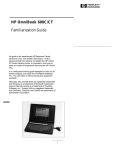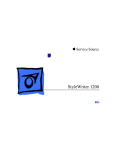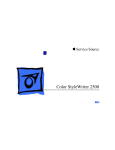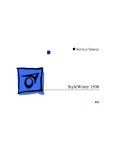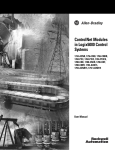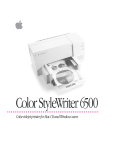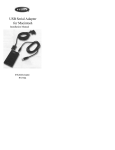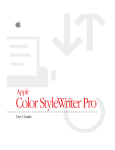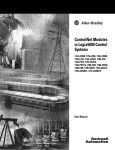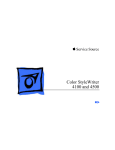Download Apple StyleWriter II Specifications
Transcript
K Service Source StyleWriter II K Service Source Basics StyleWriter II Basics Test Page - 1 Online Key Test Page Turn on the printer and hold down the online key for at least 6 seconds or until the test page prints. Basics Test Page - 2 The test page shows the ROM revision and a test pattern. Use the test pattern to determine if the ink jets are functioning properly. If lines appear broken, proceed to the “Printing” topic in the Troubleshooting chapter. K Service Source Specifications StyleWriter II Specifications Characteristics - 1 Characteristics Print Methods Throughput Serial bubble jet ink-on-demand SHQ mode 124 cps (10 cpi) HQ mode 173 cps (10 cpi) HS mode 248 cps (10 cpi) Print Head 1 by 64 nozzles Print Head Life Approximately 500 pages (normal mode) Input Buffer 9K Specifications Graphics - 2 Graphics Resolution 360 dpi (at best mode) Specifications Paper Handling - 3 Paper Handling Paper Size: LTR, LGL, A4 Weight: 16–24 lb. Capacity: 100 sheets (A4, LTR) Envelopes Size: Commercial number 10 size only (4.1 in. by 9.5 in) Capacity: 10 envelopes Transparencies Coated transparencies, or most inkjet transparencies Specifications Ink Cartridges - 4 Ink Cartridges Type Ink cartridge Ink Color Black Ink Amount Approximately 28 g (per cartridge) Life Approximately 500 pages Specifications Environmental - 5 Environmental Acoustic Noise Level Approximately 40 dB (reference level) Temperature 41–95° F (5–35° C) Humidity 10–90% (no condensation) Specifications Electrical - 6 Electrical Power Source Power Consumption U.S./Canada: 120 VAC, 60 Hz, 0.36 A U.K./Australia: 240 VAC, 50 Hz, 24 W Europe: 220 VAC, 50 Hz, 24 W 48 W maximum Specifications Physical - 7 Physical Dimensions Weight Height: 6.8 in. (173 mm) Width: 13.7 in. (347 mm) Depth: 7.6 in. (193.5 mm) Approximately 6 lb. (3 kg) K Service Source Troubleshooting StyleWriter II Troubleshooting General/ - 1 General The Symptom Charts included in this chapter will help you diagnose specific symptoms related to your product. Because cures are listed on the charts in the order of most likely solution, try the first cure first. Verify whether or not the product continues to exhibit the symptom. If the symptom persists, try the next cure. (Note: If you have replaced a module, reinstall the original module before you proceed to the next cure.) If you are not sure what the problem is, or if the Symptom Charts do not resolve the problem, refer to the Flowchart for the product family. For additional assistance, contact Apple Technical Support. Troubleshooting Symptom Charts /Preliminary Checks - 2 Symptom Charts Preliminary Checks Computer cannot find printer 1 2 3 4 Verify that StyleWriter II driver is installed. Verify that Chooser and Control Panel settings are correct. Verify that serial cable is connected. Replace serial cable. No lights or movement 1 2 Verify that printer is turned on and plugged into wall socket. Replace fuse. Print quality problems 1 2 3 4 Verify that paper is correct weight. Purge ink cartridge. Replace ink cartridge. Replace printer. Troubleshooting Mechanical problems Symptom Charts /Preliminary Checks - 3 1 2 3 4 Verify that paper is correct weight. Clear paper jam. Verify that cut sheet feeder aligns with printer. Replace printer. Troubleshooting Symptom Charts /Status Light - 4 Status Light No status lights 1 2 3 Error light on 1 2 3 4 Replace fuse. Verify that operation cable is securely connected to logic board. Replace printer. Printer is out of paper; add paper. Check for paper jam; remove jam and then press power switch. Check for carriage jam. Replace printer. Troubleshooting Symptom Charts /Printing - 5 Printing No printing 1 2 3 4 5 6 Garbled printing 1 2 3 4 Verify that interface cable between printer and computer is tightly connected. Make sure printer is selected in Chooser. Purge ink cartridge. Replace ink cartridge. Verify that right-margin sensor is seated correctly. Replace printer. Verify that interface cable between printer and computer is tightly connected. Purge ink cartridge. Replace ink cartridge. Replace printer. Troubleshooting Overprinting Symptom Charts /Printing - 6 1 2 3 Image too light or too dark White lines in printing 1 2 3 Verify that program being used is set for correct line spacing and line length. Verify that correct printer driver is installed. Replace printer. 4 Purge ink cartridge. Use 16–24 lb. cotton bond paper. Verify that forms thickness lever is set correctly (up for standard paper and down for envelopes, transparencies, labels, and heavy paper). Replace ink cartridge. 1 2 3 Purge ink cartridge. Replace ink cartridge. Replace printer. Troubleshooting Page prints off center; images are out of place Symptom Charts /Printing - 7 1 2 3 4 5 Use 16–24 lb. cotton bond paper. Verify that sheet feeder holds no more than 50 sheets. Verify that paper is inserted properly. Verify that margins in document and paper size in Page Setup are set correctly. Replace printer. Ink appears on back of paper 1 2 3 Clean platen with soft, dry cloth. Clean platen rollers. Replace printer. Image wavy, splotchy, or distorted 1 2 3 Purge ink cartridge. Replace ink cartridge. Replace printer. Troubleshooting Symptom Charts /Carrier Movement - 8 Carrier Movement Erratic carrier motion Replace printer. Power light is on; carrier does not move 1 2 Printer does not perform self-test; ready light is on Replace printer. Carrier grinds, hums loudly, or locks 1 2 Make sure carrier area is clear of obstructions. Replace printer. Verify that right-margin sensor is seated correctly. Replace printer. Troubleshooting Symptom Charts/Paper Feed - 9 Paper Feed No paper feed 1 2 3 4 Verify that cut sheet feeder aligns with printer. Release paper pressure plate on cut sheet feeder. Make sure paper path is clear of obstructions. Replace printer. Grinding during paper feed 1 2 Make sure paper path is clear of obstructions. Verify that forms thickness lever is set correctly (up for standard paper and down for envelopes, transparencies, labels, and heavy paper). Verify that cut sheet feeder aligns with printer. Replace printer. 3 4 Troubleshooting Symptom Charts /Paper Feed - 10 Paper feed difficulties: binding, tearing 1 Envelope feed problems 1 2 3 4 5 6 2 Verify that forms thickness lever is set correctly (up for standard paper and down for envelopes, transparencies, labels, and heavy paper). Make sure paper path is clear of obstructions. Verify that paper is inserted properly. Use 16-24 lb. cotton bond paper. Verify that cut sheet feeder aligns with printer. Replace printer. When printing envelopes: (a) adjust paper thickness lever, (b) do not run cut sheets and envelopes in same print job, and (c) reset paper thickness lever when finished printing envelopes. Replace printer. Troubleshooting Symptom Charts /Miscellaneous - 11 Miscellaneous Operations panel buttons don’t work 1 Software-specific problem 1 2 2 Verify that operations panel cable is securely connected to logic board and operations panel. Replace printer. Verify that software is known-good. Verify that software is compatible with TrueType fonts. (Check your software application manual.) K Service Source Take Apart StyleWriter II Take Apart Covers - 1 Covers No preliminary steps are required before you begin this procedure. Review the ESD precautions in Bulletins/Safety. Caution: Do not use excessive force to release a latch or tab. Note: This procedure covers the removal of all the covers on the printer. Take Apart Covers - 2 Front Access Cover 1 2 Arm 3 Arm Front Access Cover 4 Note: The front access cover is held in place by two arms that function as hinges. Plastic tabs at the end of the arms fit into knobs on the inside of the upper case. Open the front access cover. Press the end of each arm inward and free the arm tabs from the upper case. Lift off the front access cover. Take Apart Covers - 3 Upper Case 1 Upper Case Latch Release the right side latch and lift the upper case a short distance. Repeat for the left side latch and remove the case. Take Apart Covers - 4 Output Tray Assembly 1 0utput Tray Pull out the tray until the two tabs rest against the stops. Press down and remove the tray. Take Apart Covers - 5 Rear Cover Top Latch 1 Rear Cover 2 3 Bottom Latch Press out the two latches on the bottom of the printer and press up on the rear cover. Release the two latches on the top of the printer. Lift up and remove the rear cover. Take Apart Covers - 6 Cut Sheet Feeder Side Latch Cut Sheet Feeder Cover 1 2 Front Latch Front Latch Press in the front latch and release the side latch. Pull back and remove the cover. Take Apart Covers - 7 Paper Support Paper Support 1 2 3 Pull out the paper support until it rests against the stops. Push the support forward and disconnect the latches. Slide out the paper support. Take Apart Covers - 8 Bottom Cover 1 2 Front Latch Bottom Cover Front Latch Using a screwdriver, push out the two front latches. Pull up and remove the bottom cover. Take Apart Covers - 9 Replacement Note: Make sure the bottom cover circular tabs fit into the proper position in the printer frame. Take Apart Covers - 10 Latch On/Off Button Replacement Note: Make sure the latch on the upper case engages the on/off button on the logic board. Take Apart Cut Sheet Feeder - 11 Cut Sheet Feeder Before you begin, remove covers. Review the ESD precautions in Bulletins/Safety. Caution: Do not get the ink on your hands or clothes. Although the ink is water soluble, it contains dyes that will stain. Cut Sheet Feeder Take Apart Cut Sheet Feeder - 12 1 2 Alignment Pin Latch Using a Phillips screwdriver, remove the two screws that secure the cut sheet feeder to the printer. Press in the latch and remove the cut sheet feeder. Replacement Note: Make sure the alignment pins on the cut sheet feeder are aligned with the printer frame. Take Apart Roller and Spring - 13 Roller and Spring Before you begin, remove front cover. Review the ESD precautions in Bulletins/Safety. Front Cover Take Apart Roller and Spring - 14 1 2 Push the roller forward slightly. Carefully lift up and remove the roller and spring. Take Apart Cut Sheet Feeder Roller - 15 Cut Sheet Feeder Roller Before you begin, remove the following: • Covers • Cut sheet feeder Review the ESD precautions in Bulletins/Safety. Cut Sheet Feeder Roller Take Apart Cut Sheet Feeder Roller - 16 1 2 3 Roller Caution: When the roller is removed, the feeder gear is loose. Remove the roller slowly so that the gear will not fly off. Press in the two latches on the cut sheet feeder roller and push out the roller. Remove the gear. Lift up on one end of the roller and remove the other end from the mounting hole. Take Apart Line/Notch Line/Notch Cut Sheet Feeder Roller - 17 Replacement Note: Align the notch on the upper gear with the upper line on the cut sheet feeder. Align the notch on the lower gear with the lower line on the cut sheet feeder. Take Apart Carriage Assembly - 18 Carriage Assembly Before you begin, remove the following: • Covers • Cut sheet feeder Review the ESD precautions in Bulletins/Safety. Caution: To prevent the print nozzles from clogging, do not touch or wipe them. Carriage Assembly Take Apart Carriage Assembly - 19 1 Connector CNH Disconnect connector CNH from the logic board. Take Apart Carriage Assembly - 20 2 Remove the plastic ribbon cable and cable holder. Replacement Note: Make sure the ribbon cable holes are mounted on the two tabs on the inside of the ribbon cable holder. Take Apart Carriage Assembly - 21 3 4 Carriage Release Clip Latch Latch Press in the two latches. Push up and remove the carriage release clip. Take Apart Carriage Assembly - 22 5 Shaft Clip Carefully remove the shaft clips from each side of the carriage assembly. Take Apart Carriage Assembly - 23 6 Carriage Guide Move the carriage to the far right and disconnect the carriage from the carriage guide. Caution: Do not remove or loosen the two screws on top of the carriage guide. Loosening or removing these screws will cause the carriage to go out of alignment. Take Apart Carriage Assembly - 24 7 Using a flat-blade screwdriver, carefully press in the idler roller and disconnect the carriage belt. Take Apart Carriage Assembly - 25 8 9 Hold the carriage assembly and push back the carriage shaft. Slide out the carriage shaft. Take Apart Carriage Motor - 26 Carriage Motor Carriage Motor Before you begin, remove the following: • Covers • Cut sheet feeder Review the ESD precautions in Bulletins/Safety. Take Apart Carriage Motor - 27 1 Connector CNCR Connector CNH Disconnect connectors CNH and CNCR from the main board. Take Apart Carriage Motor - 28 2 Using a flat-blade screwdriver, press in the idler roller and disconnect the carriage belt. Take Apart Carriage Motor - 29 3 4 Using a Phillips screwdriver, remove the two mounting screws. Lift up and pull out the carriage motor. Take Apart Eject Roller - 30 Eject Roller Before you begin, remove covers. Review the ESD precautions in Bulletins/Safety. Eject Roller Take Apart Eject Roller - 31 1 Grasp one end of the roller, press it firmly to the side, and snap the roller out of the mounting holes. Take Apart Fuse - 32 Fuse Before you begin, remove the following: • Covers • Cut sheet feeder Fuse Review the ESD precautions in Bulletins/Safety. Take Apart Fuse - 33 1 Remove the fuse cover and replace the fuse. K Service Source Exploded View StyleWriter II Exploded View 1 Whole Unit 110V 661-0785 220V 661-1010 Rear Cover 922-0184 Upper Case Cover 922-0185 Cut Sheet Feeder Cover 922-0188 Paper Support 922-0189 Cut Sheet Feeder Roller 922-0192 Front Cover 922-0186 Chassis* Carriage Motor 922-0195 Eject Roller 922-0191 Carriage Belt 922-0193 Carriage Release Clips 922-0197 Clip, Shaft 922-0196 Carriage Unit 922-0194 Feet, Bottom 922-0182 Output Tray 922-0187 Fuse 125 V 922-0180 250 V 922-0181 BottomCase 922-0198




























































